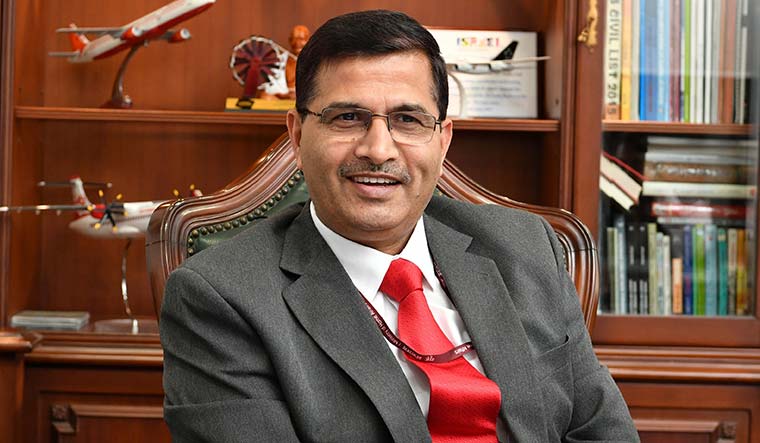ASHWANI LOHANI entered the Limca Book of Records for holding engineering degrees in four different streams. It seems the qualifications came in handy in his three-decade-long career that saw him head both Indian Railways and Air India. His ongoing second tenure as chairman and managing director of the national carrier might well see the airline’s privatisation. Lohani took time off to share his thoughts with THE WEEK. Excerpts from an exclusive interview:
Q/You have been involved in many operational decisions, like issuing directives to pilots to close their announcements by saying ‘Jai Hind’. Do you feel getting into each and every small aspect of it is the way to go about it?
A/Air India has issues related to processes and governance. I know my organisation requires major transformational reforms, in the way we enter into contracts, the way we enter into decisions, the way we do a lot of things. Till that is done, yes, there are times when I have to take off my boots and get down in the mud. It is an essential part of running an organisation. When you say or hear ‘Jai Hind’, it gives you a lot of pride. That is why we did that. And when you have pride, it helps out.
Q/Was there a political side to the decision to serve only vegetarian food on domestic flights?
A/It was purely my decision. Nothing political about it. That is a good part of this government; it does not interfere in such matters at all. One reason was that serving becomes easier; you do not have to keep on asking everyone. There have been cases in the Railways as well as in airlines of food getting mixed up, of a vegetarian being served non-veg food. This obviates that. And lastly, it definitely is a bit cheaper. So why should not we do it? It is administratively a better decision. And nobody travels to eat.
Q/If the government sells all its stake, what will happen to Air India One, the VVIP plane operated for the president and the prime minister?
A/Only the ministry can tell you about this. We are running it as long as it is with us.
Q/The current sale move has Rs30,000 crore debt being hived off and held by a separate holding vehicle. Keeping that aside, how attractive is the airline to a prospective buyer?
A/We are still the country’s largest airline in terms of revenue. Our domestic share is only 12-13 per cent, but our international share (of traffic from India) is about 18 per cent. We still have the best pilots and engineers. I would rate our cabin crew the best. We have solid staff, solid routes, and a lot of inherent strengths.
There are a lot of weaknesses, too. We would like to do some more process reforms, add fleet, and change the way we work. But still, this airline has a lot of strengths. It can grow and become one of the finest airlines in the world. But that can happen only in private hands. Because our hands are always tied. I think it is a very, very good buy.
Q/Initially, the government wanted to retain a 24 per cent stake. The new terms see it getting completely out. How did the change in thinking come about?
A/Last time, we could not sell. Those ideas did not succeed. It is good. It will give total freedom to the new buyer.
Q/Who all have shown interest so far?
A/I cannot reveal that.
Q/You have had many meetings with the unions. Are they on board with the sale?
A/They are on board. The government and Air India are very clear that we will take care of the genuine interests of the employees.
Q/Do they have any specific demands?
A/They are concerned about their medical benefits and their passages (the perk of free tickets). Whenever there is a change of ownership, there always will be a lot of concerns. There are concerns, but there is no alarm. The staff knows that the government and management are taking all efforts to address those concerns.
Q/Your crew-to-aircraft ratio is one of the highest in the world.
A/Government organisations suffer from a lot of wrong perceptions. This is a totally wrong perception that we are overstaffed. We did not recruit for the last 25 years; we have now come to a scenario where we would like to recruit new staff. Our wage costs are at par with the private sector, despite high inefficiency. Staff is not high at all.
Q/Air India Express, which is profitable, is also being bundled in for the sale. Wouldn’t it have fetched a better price if it was sold separately?
A/The decision is to sell them together.


